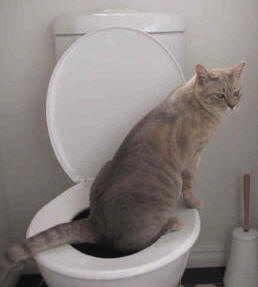The Dangers of Flushing Cat Poop Down Your Toilet - Advice for Safer Handling
The Dangers of Flushing Cat Poop Down Your Toilet - Advice for Safer Handling
Blog Article
Just how do you really feel on the subject of How to Dispose of Cat Poop and Litter Without Plastic Bags?

Intro
As cat proprietors, it's necessary to be mindful of exactly how we throw away our feline pals' waste. While it may seem convenient to flush cat poop down the toilet, this technique can have detrimental effects for both the atmosphere and human wellness.
Environmental Impact
Purging cat poop introduces dangerous pathogens and bloodsuckers right into the water supply, posing a considerable risk to aquatic ecosystems. These contaminants can negatively impact aquatic life and compromise water high quality.
Health and wellness Risks
In addition to environmental issues, purging feline waste can also posture health dangers to humans. Cat feces might have Toxoplasma gondii, a parasite that can cause toxoplasmosis-- a potentially extreme health problem, especially for expecting ladies and people with damaged immune systems.
Alternatives to Flushing
Fortunately, there are safer and extra accountable methods to get rid of pet cat poop. Think about the following options:
1. Scoop and Dispose in Trash
The most common approach of taking care of cat poop is to scoop it into an eco-friendly bag and toss it in the garbage. Be sure to utilize a dedicated trash scoop and take care of the waste promptly.
2. Use Biodegradable Litter
Opt for biodegradable cat litter made from materials such as corn or wheat. These clutters are eco-friendly and can be securely dealt with in the trash.
3. Hide in the Yard
If you have a yard, think about hiding cat waste in an assigned area away from veggie yards and water resources. Be sure to dig deep adequate to prevent contamination of groundwater.
4. Set Up a Pet Waste Disposal System
Purchase a family pet waste disposal system especially developed for feline waste. These systems make use of enzymes to break down the waste, decreasing odor and ecological impact.
Verdict
Accountable animal possession prolongs beyond giving food and sanctuary-- it additionally involves proper waste management. By refraining from flushing pet cat poop down the toilet and opting for different disposal methods, we can reduce our ecological footprint and protect human wellness.
Why You Should Never Flush Cat Poop Down the Toilet
A rose by any other name might smell as sweet, but not all poop is created equal. Toilets, and our sewage systems, are designed for human excrement, not animal waste. It might seem like it couldn’t hurt to toss cat feces into the loo, but it’s not a good idea to flush cat poop in the toilet.
First and foremost, assuming your cat uses a litter box, any waste is going to have litter on it. And even the smallest amount of litter can wreak havoc on plumbing.
Over time, small amounts build up, filling up your septic system. Most litter sold today is clumping; it is made from a type of clay that hardens when it gets wet. Ever tried to scrape old clumps from the bottom of a litter box? You know just how cement-hard it can get!
Now imagine just a small clump of that stuck in your pipes. A simple de-clogger like Drano isn’t going to cut it. And that means it’s going to cost you big time to fix it.
Parasitic Contamination
Believe it or not, your healthy kitty may be harboring a nasty parasite. Only cats excrete Toxoplasma in their feces. Yet it rarely causes serious health issues in the cats that are infected. Most people will be fine too if infected. Only pregnant women and people with compromised immune systems are at risk. (If you’ve ever heard how women who are expecting are excused from litter cleaning duty, Toxoplasma is why.)
But other animals may have a problem if infected with the parasite. And human water treatment systems aren’t designed to handle it. As a result, the systems don’t remove the parasite before discharging wastewater into local waterways. Fish, shellfish, and other marine life — otters in particular — are susceptible to toxoplasma. If exposed, most will end up with brain damage and many will die.
Depending on the species of fish, they may end up on someone’s fish hook and, ultimately on someone’s dinner plate. If that someone has a chronic illness, they’re at risk.
Skip the Toilet Training
We know there are folks out there who like to toilet train their cats. And we give them props, it takes a lot of work. But thanks to the toxoplasma, it’s not a good idea.

Hopefully you liked our post about How to Dispose of Cat Poop and Litter Without Plastic Bags. Thank you so much for taking the time to read our content. Are you aware of another individual who is excited about the topic? Do not hesitate to promote it. Thank you for taking the time to read it.
Call Today Report this page